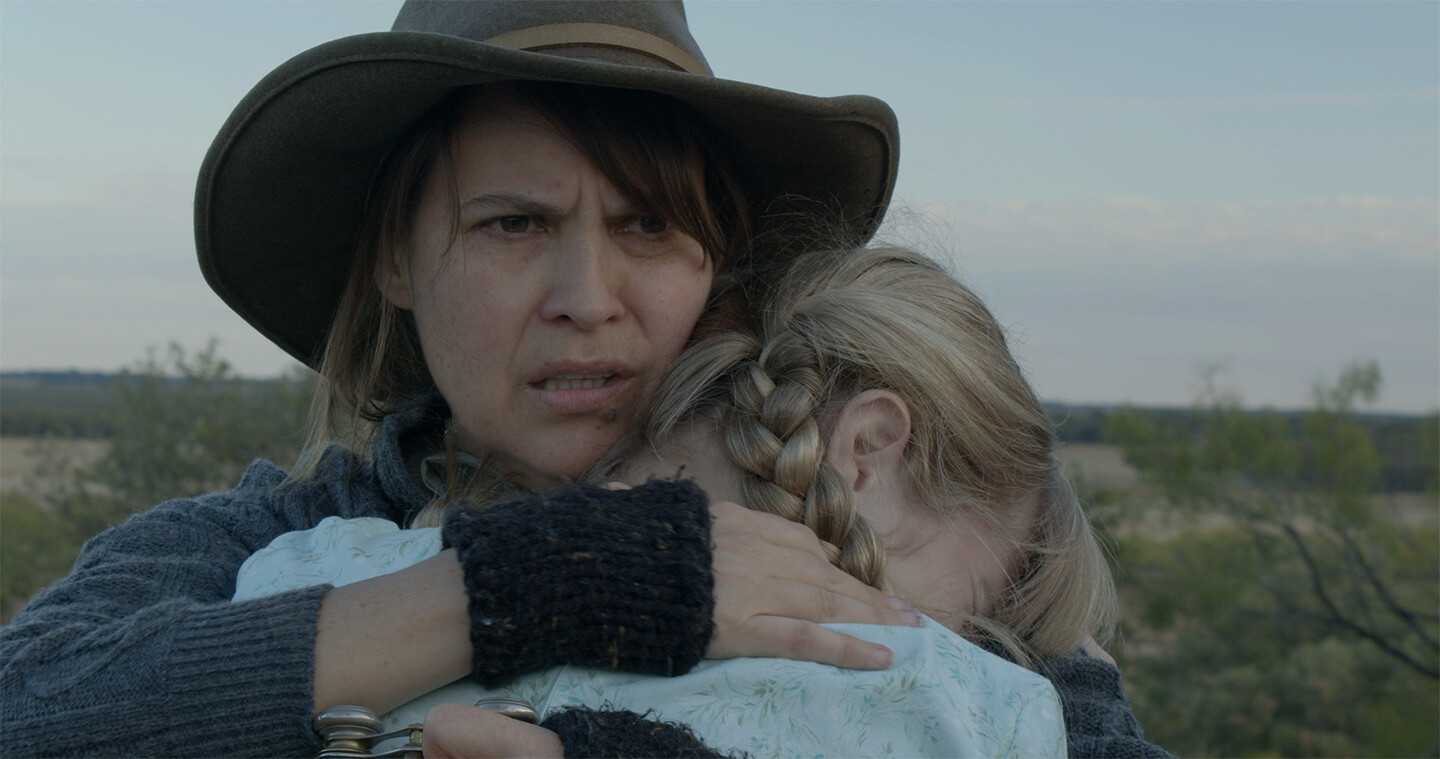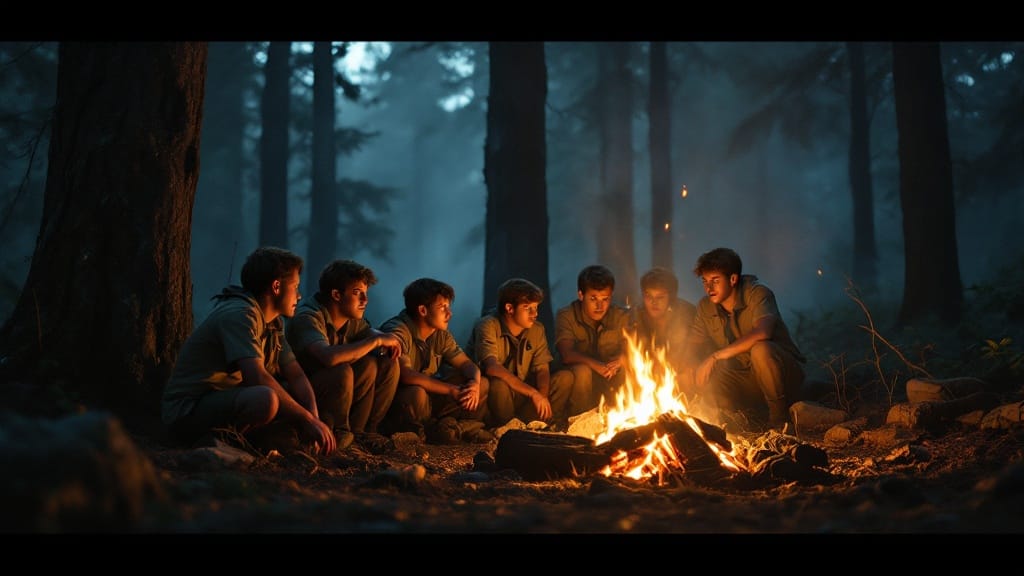Drama
Wildcat

Directed by Laurie Powers Going
Warning – This review may contain spoilers.
Wildcat tells the story of Clara (Brenda Hattingh Peatross) a determined mother searching for answers after her husband, Sam (Johnny Chops), and daughter, Dottie (Elle Graper), mysteriously disappear. Set in early 1900s Texas during the oil boom, the film weaves themes of desperation, isolation, and the supernatural as Clara stalks the crew Sam worked with, believing them responsible for her family’s disappearance. The narrative takes a darker turn when Dottie suddenly reappears, but with something unsettling about her. Throughout a long, tension-filled night, Clara and Otis, the oil well owner (Adam Kitchen) come face to face, while a malevolent force toys with them.
The film effectively builds suspense and I found Clara’s desperation to be compelling as Peatross delivers a strong performance that carries the weight of her character’s emotional turmoil. Her portrayal of a mother driven by grief and anger anchors the film’s tension. However, the story leaves some critical gaps. There’s no clear explanation about how long Sam and Dottie have been missing or what circumstances led to their disappearance, which makes it harder to connect deeply with Clara’s quest. Dottie’s ghostly return, while eerie, lacks the necessary backstory to make her presence feel fully justified within the narrative, which diminishes the emotional impact of the film’s conclusion.
The sound design creates a tense atmosphere especially with the ominous noises that heighten the sense of dread. However, the song choice at the very end doesn’t fit with the rest of the film’s tone. The cinematography misses the opportunity to fully showcase the vast, desolate plains of Texas, which could have deepened the themes of isolation and loneliness. While the editing was uneven in sustaining the horror aspects, there are standout moments, particularly the scene where Otis throws a knife at Dottie’s ghost, a sequence that is both chilling and well-executed.
The performances were solid with Brenda Hattingh Peatross bringing a strong sense of intensity to Clara, and Adam Kitchen’s portrayal of Otis offering a grounded counterbalance to her increasingly frantic behavior. Johnny Chops brings a subtle but important layer to Sam’s backstory through flashbacks, while Elle Graper as Dottie brings an eerie, unsettling presence to her ghostly role.
Wildcat struggles to fully connect due to its lack of clear backstory and character development. The plot feels disjointed at times, and the motivations behind certain supernatural elements remain unclear. The final scene, while visually striking, doesn’t carry the emotional weight it could have if the film had done more to build the relationship between Clara, Sam, and Dottie.
Wildcat explores themes of desperation, grief, and isolation within the framework of a thriller set in the Texas oil boom. While Laurie Powers Going delivers a suspenseful short, and the cast, particularly Brenda Hattingh Peatross and Adam Kitchen, bring strong performances, the film leaves too many questions unanswered. I feel audiences seeking a slow-burn thriller may appreciate the tension. I just wanted more backstory and deeper character connections. Still, its worth a watch!
Comedy
Troop 458

WARNING! This review contains SPOILERS!
Troop 458, written by Trevor Allen, captures the often daunting, yet transformative, experience of being the new kid in a world full of unknowns. We follow Sidney, an anxious boy thrown into his first Boy Scouts campout, where he faces both the perils of acceptance and the strangeness of his eccentric scout leader. As spooky campfire tales start to weave into reality, Sidney is forced to confront his fears head-on, finding moments of humor, adventure, and unexpected camaraderie along the way.
I like the concept of Troop 458 because it blends coming-of-age themes with a playful sense of adventure, all wrapped in an atmosphere tinged with just the right amount of mystery. Allen’s writing brings to life a cast of memorable characters, especially through Sidney’s journey of growth. The tension between humor and fear feels authentic to the Boy Scouts’ setting, and it captures the real challenges kids face when trying to fit in.
What resonated with me most was the screenplay’s exploration of courage—not just in facing mythical dangers but in embracing who you are, quirks and all. Some aspects could benefit from a clearer focus on character motivations and tighter pacing to keep the momentum strong, particularly during scenes that blur the line between myth and reality.
The dialogue is great in many places, offering humor that feels natural for a group of young scouts. There were moments where I felt the conversations could be a bit sharper or more distinct to heighten the comedic or emotional impact. Character development is a strong suit, with Sidney’s evolution being both relatable and satisfying, but secondary characters could have a bit more depth to elevate the ensemble.
Allen’s Troop 458 is polished, with solid grammar, spelling, and formatting that adhere to professional standards. The structure is clean and makes for an easy read, setting up scenes that are visually compelling.
Troop 458 delivers an enjoyable mix of humor, heart, and a touch of the supernatural, leaving me eager to see how it might come to life on screen.
Drama
Ellie

WARNING! This review contains SPOILERS!
Directed by Marcus Mejia
Ellie is a refreshing experience that pulled me right into the world of a young, shy man navigating a work meeting while secretly yearning for a bit of magic in his everyday life. We’re taken through his imaginative, musical daydream—a beautiful escape from reality that reveals his true desires. I loved how the film peeled back layers of his personality without a single word of dialogue. Instead, the music carried the narrative, and surprisingly, it worked so well.
Marcus Mejia did an excellent job blending dramedy elements to keep the film engaging. The moments of humor and more emotional beats make the film feel well-rounded. Mejia’s choice to swap dialogue for music was a bold move, and it paid off. I could feel the character’s internal struggles and hopes as the music brought out emotions words couldn’t.
The lighting felt intimate, almost like it was giving us a window into the protagonist’s soul, and the cinematography perfectly captured the whimsical tone of his daydreams. I noticed how smoothly the editing transitioned between reality and fantasy, which made the story’s pacing feel just right. The sound design was on point, with every beat of music syncing beautifully with the character’s emotional highs and lows.
I loved when the protagonist’s daydream overlapped with reality, creating this seamless blend that felt so relatable. I admired how it portrayed the quiet, unspoken dreams we all carry. It was a reminder of the power of our inner worlds and how much magic lies just beneath the surface of our everyday lives.
Ellie left a gentle yet lasting impression. It’s a unique, heartfelt short film that shows how creative risks can pay off. Ellie is a memorable journey that’s definitely worth the watch.
Drama
Finding Acceptance

Directed by Andrew DeBennett
WARNING! This review contains spoilers.
Watching “Finding Acceptance” was an experience that brought me back to those anti-bullying films we’d see in school assemblies. The story follows Mary, a new student in a wheelchair, navigating the often-tough world of school friendships. Initially, she faces teasing from her peers but finds a genuine friend in Liz, who even manages to extend kindness to Mary’s bully, Max. The message is straightforward and clear: acceptance and empathy matter.
I could see what the director was aiming for—Andrew DeBennett notes that the film was both a joy to create and a personal project. The heart of the story shines through, with Kaylah Pollock (Mary) and Laney Hansen (Liz) bringing warmth to their roles. Their connection feels genuine, even if the overall story feels a bit too familiar.
Technically, the film could have used some fine-tuning. The sound mix was rough, with the music often drowning out dialogue. The editing also felt choppy, making it harder to stay immersed in the story. The dialogue leaned into clichés—phrases like “loser” felt outdated and took away from the realism. The cinematography, however, was a bright spot, creating a warm, inviting feel that suited the film’s positive message.
I felt like the story could’ve benefited from more depth. The bullying that Mary faces is minimal, making her eventual friendships feel somewhat predictable. For younger audiences, this simplicity might be engaging and easy to digest, but it misses the chance to delve into the more complex aspects of acceptance.
In the end, “Finding Acceptance” delivers a positive, albeit simple, message. While it didn’t connect with me on a deeper level, I can see it being a useful film for educational settings, especially for younger viewers learning about kindness and friendship.










